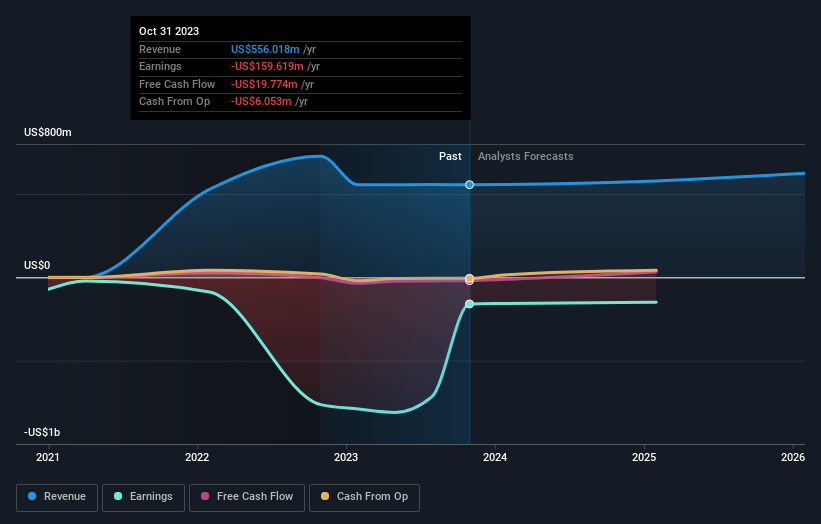Public companies account for 38% of Skillsoft Corp.'s (NYSE:SKIL) ownership, while institutions account for 34%
Key Insights
The considerable ownership by public companies in Skillsoft indicates that they collectively have a greater say in management and business strategy
The top 4 shareholders own 54% of the company
Every investor in Skillsoft Corp. (NYSE:SKIL) should be aware of the most powerful shareholder groups. And the group that holds the biggest piece of the pie are public companies with 38% ownership. Put another way, the group faces the maximum upside potential (or downside risk).
And institutions on the other hand have a 34% ownership in the company. Insiders often own a large chunk of younger, smaller, companies while huge companies tend to have institutions as shareholders.
Let's delve deeper into each type of owner of Skillsoft, beginning with the chart below.
View our latest analysis for Skillsoft
What Does The Institutional Ownership Tell Us About Skillsoft?
Institutions typically measure themselves against a benchmark when reporting to their own investors, so they often become more enthusiastic about a stock once it's included in a major index. We would expect most companies to have some institutions on the register, especially if they are growing.
We can see that Skillsoft does have institutional investors; and they hold a good portion of the company's stock. This implies the analysts working for those institutions have looked at the stock and they like it. But just like anyone else, they could be wrong. It is not uncommon to see a big share price drop if two large institutional investors try to sell out of a stock at the same time. So it is worth checking the past earnings trajectory of Skillsoft, (below). Of course, keep in mind that there are other factors to consider, too.
We note that hedge funds don't have a meaningful investment in Skillsoft. Naspers Limited is currently the largest shareholder, with 38% of shares outstanding. Paradice Investment Management Pty Ltd. is the second largest shareholder owning 7.7% of common stock, and Michael Klein holds about 4.2% of the company stock. Michael Klein, who is the third-largest shareholder, also happens to hold the title of Member of the Board of Directors. Furthermore, CEO Jeffrey Tarr is the owner of 0.8% of the company's shares.
On looking further, we found that 54% of the shares are owned by the top 4 shareholders. In other words, these shareholders have a meaningful say in the decisions of the company.
While studying institutional ownership for a company can add value to your research, it is also a good practice to research analyst recommendations to get a deeper understand of a stock's expected performance. Quite a few analysts cover the stock, so you could look into forecast growth quite easily.
Insider Ownership Of Skillsoft
While the precise definition of an insider can be subjective, almost everyone considers board members to be insiders. The company management answer to the board and the latter should represent the interests of shareholders. Notably, sometimes top-level managers are on the board themselves.
I generally consider insider ownership to be a good thing. However, on some occasions it makes it more difficult for other shareholders to hold the board accountable for decisions.
Our most recent data indicates that insiders own some shares in Skillsoft Corp.. It has a market capitalization of just US$121m, and insiders have US$10m worth of shares, in their own names. This shows at least some alignment, but we usually like to see larger insider holdings. You can click here to see if those insiders have been buying or selling.
General Public Ownership
The general public-- including retail investors -- own 17% stake in the company, and hence can't easily be ignored. This size of ownership, while considerable, may not be enough to change company policy if the decision is not in sync with other large shareholders.
Public Company Ownership
Public companies currently own 38% of Skillsoft stock. We can't be certain but it is quite possible this is a strategic stake. The businesses may be similar, or work together.
Next Steps:
It's always worth thinking about the different groups who own shares in a company. But to understand Skillsoft better, we need to consider many other factors. To that end, you should be aware of the 1 warning sign we've spotted with Skillsoft .
But ultimately it is the future, not the past, that will determine how well the owners of this business will do. Therefore we think it advisable to take a look at this free report showing whether analysts are predicting a brighter future.
NB: Figures in this article are calculated using data from the last twelve months, which refer to the 12-month period ending on the last date of the month the financial statement is dated. This may not be consistent with full year annual report figures.
Have feedback on this article? Concerned about the content? Get in touch with us directly. Alternatively, email editorial-team (at) simplywallst.com.
This article by Simply Wall St is general in nature. We provide commentary based on historical data and analyst forecasts only using an unbiased methodology and our articles are not intended to be financial advice. It does not constitute a recommendation to buy or sell any stock, and does not take account of your objectives, or your financial situation. We aim to bring you long-term focused analysis driven by fundamental data. Note that our analysis may not factor in the latest price-sensitive company announcements or qualitative material. Simply Wall St has no position in any stocks mentioned.

 Yahoo Finance
Yahoo Finance 

